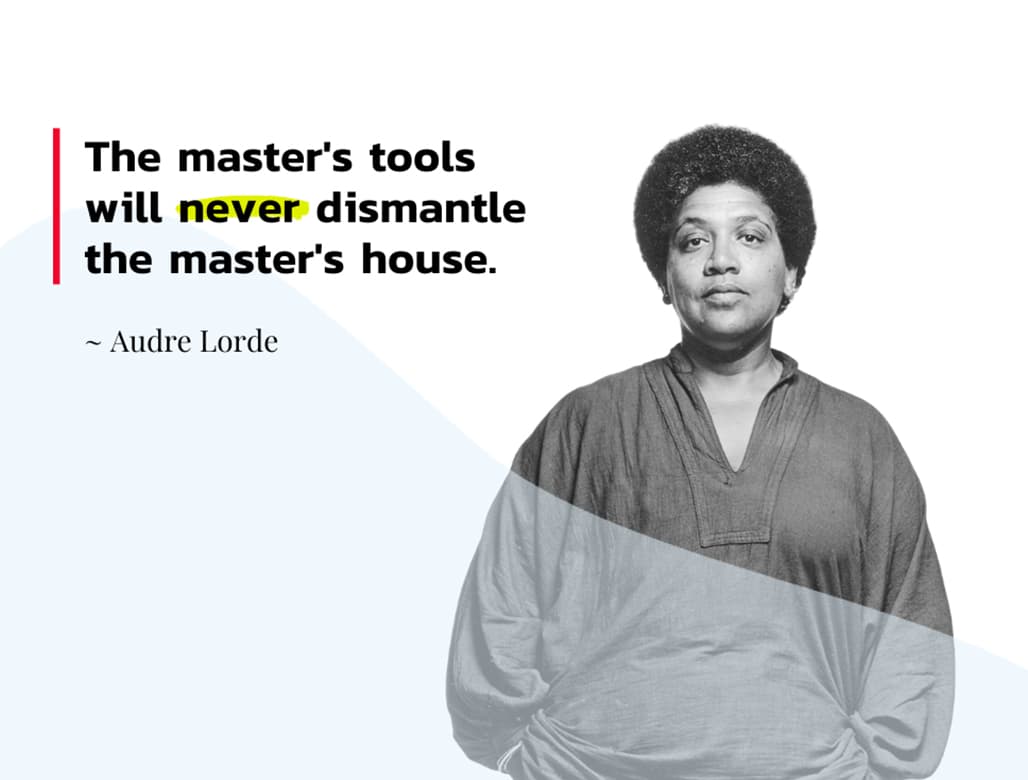When the Oppressor is in the Room
Originally posted in 2019, a West Hub member reflects on the often unspoken issue of racism and privilege in facilitators and leaders within anti-racist and social justice spaces.

“The master’s tools will never dismantle the master’s house” – Audre Lorde
As I write this reflection piece, it is currently Black History Month here in Canada and I’m reflecting heavily on the variety of topics that were covered at The Inclusive Facilitation Training, hosted by City for All Women Initiative and Righting Relations Ottawa in January 2019.
The learning experience I appreciated the most was that participants were provided with the opportunity to bring forward challenges they’ve experienced or observed while facilitating. The driving question for the training was, “What can we do as facilitator to create an atmosphere where diverse participants are equipped to navigate the tensions in a challenging environment and have a positive learning experience?” A variety of helpful tools, techniques, and values were shared and learned among the group in an environment where participatory learning occurred.
A challenge that is prevalent in anti-racism and intercultural work environments is the often unspoken issue of facilitators and leaders who are personally unwilling to address what society refers to as their “white fragility”, “white privilege”, and “position of power”. When facilitators are not comfortable with being self-reflective about their own racism, it creates a barrier to bringing forward important issues that people of colour (POC) face. If honest conversations about racism are avoided by facilitators, important intersectional issues such as poverty, the justice system, housing, and employment discrimination cannot be fully addressed.
Participants are prevented from learning about or addressing issues that involve moving beyond surface level discussions involving race when facilitators engage in racial microaggressions, tone policing, derailing, silence, and avoidance. These actions are a form of oppression. When women of colour are silenced, we are taught that we are not allowed to be an active participant in our individual and collective efforts to free ourselves from the tight grip of colonialism, sexism, and racial oppression.
Facilitators who are not comfortable addressing their own racism end up doing some of the following:
- Guiding the discussion based on their own level of comfort with racial topics
- Control terminology by avoiding terms such as “white fragility” or “Black Lives Matter”
- Determine locations for workshops and events by hosting at facilities outside of cultural gathering space
For facilitators who are working towards positive, empowering, and healthy community change, it is imperative that self-reflection be a part of one’s practice. Actions are never enough; it is one’s heart, intentions, and beliefs that will be the driving force behind sustainable and transformational individual and community change.
The amount of free emotional and intellectual labour that is expended by women facilitators of colour who work with non-racialized leaders doing intercultural, anti-racism, and inter-faith work can be draining. But the difficult yet rewarding work must continue. This is why groups such as Righting Relations are needed, woman-led communities where we can all learn to move beyond the surface level in working towards social change. In the words of Audre Lorde, “For the master’s tools will never dismantle the master’s house. They may allow us to temporarily beat him at his own game, but they will never enable us to bring about genuine change.”
Posted Under:
anti-oppression, anti-racism, emotional labour, facilitation, oppression, power, Racism, Western Hub, white fragility, Whiteness